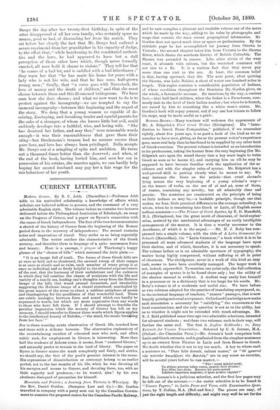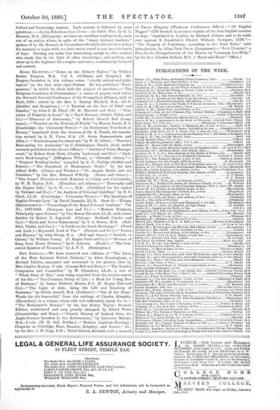Scn000-Booxs.—Many teachers will welcome the appearance of Mr. A. Sidgwick's
First Greek Writer (Rivingtons). His "Intro-
duction to Greek Prose Composition," published, if we remember rightly, about five years ago, is as good a book of the kind as we re- member to have seen, giving, as far as the present writer's experience goes, more real help than he has found to be supplied by any other book of Greek exercises. The present volume is intended as an introduction to its predecessor, taking the learner from the very beginning (for Mr.
Sidgwick acts upon the sound theory that a boy must begin to write Greek as soon as he learns it), and carrying him on till he may be supposed to have become familiar with the application of the ac cidence and with the simpler rules of syntax. Mr. Sidgwick has a well-proved skill in putting clearly what he means to say. We may instance the hints on the article—that cruel obstacle lying across the very beginning of a young scholar's way— on the tenses of verbs, on the use of oh and dj, none of them, of course, containing any novelty, but all admirably clear and - precise. The exercises are constructed on the principle of being as little tedious as may be,—a laudable principle, though one that makes, we fear, little practical difference to the average schoolboy, to
whom, when he is translating into Greek or Latin, all English seems tedious nonsense.—The Primer of Greek Syntax, by E. D. Mansfield,
M.A. (Rivingtons), has the great merit of clearness, of lucid explan- ation, assisted by the mechanical advantages of an easily intelligible arrangement of the matter. It is thus a worthy successor to the Accidence, of which it is the sequel.—Mr. H. J. Roby has com-
pressed into a single volume, with the title of A Latin Grammar for Schools (Macmillan), his "Latin Grammar," a book which it is to be
presumed all more advanced students of the language have upon their shelves, and of which, therefore, it is not necessary to speak. The volume before us is an admirable specimen of typography, the matter being highly compressed, without suffering at all in point of clearness. The abridgment, never in a work of this kind an easy task, seems to have been excellently managed. The larger work is not, indeed, superseded. To mention one point only, the full collection of examples of syntax is to be found there only ; but the utility of the shorter manual is evident. A student may easily lose himself in a grammar or in a dictionary that is too large for his needs. Mr.
Roby's volume is of a moderate and useful size. We have before us two volumes adapted for the practice of translating unprepared, or, in the technical language of teachers, "unseen" passages, that is now happily gaining universal acceptance. Oxford and Cambridge now make such translation a necessary for " satisfying " the examiners at the local examinations, and the only question is not as to the utility, but as to whether it might not be extended with much advantage. Mr. E. J. Reid published some time ago two admirable selections, intended for advanced students ; and these two volumes, each in their way, will
further the same end. The first is Anglice Reddenda ; or, Easy Extracts for Unseen Translation. Selected by C. S. Jerram, M.A.
(Oxford : the Clarendon Press.)—Mr. Jerram's book comprises both Latin and Greek extracts, and is graduated from the simplest sentences up to an extract from Plautus in Latin and from Homer in Greek.
We doubt whether this is not to try too much. A boy to whom such a sentence as, "Dum felis dormit, salinnt muses," or "0! xpno-Tol Taw woArrav baup.ciCoucri Thy f3arrihia," are in any sense an exercise, will be several years before he can master,— " Eho ! senex minimi preti. Ta attigas paerum isthae cause, quando tacit strenue! Itur iUinc jure dicta. Hoccine hic pacto potest Iuhibere imperiam magister, si ipsus primus vapulet ?"
But Mr. Jerrarn's is a judicious selection, and the first few pages may be left out of the account.—An easier selection is to be found in "Unseen Papers," in Latin Prose and Verse, with Examination Ques- tions, by T. Collins, M.A. (Bell and Son.) The pieces are easy, of just the right length and difficulty, and might very well be set for the Oxford and Cambridge Juniors. Each extract is followed by some questions.—In his Selections from Ccesar : the Gallic War, by G. L. Bennett, M.A. (Rivington), we have an excellent reading-book, made out of an author whom, in spite of the "many eminent teachers" spoken of by Mr. Bennett in his preface who think him the best writer for learners to begin with, we have never cared to put into the bands of boys. Nothing can make him interesting, except to older readers who study him in the light of other knowledge ; and nothing can clear up to the beginner his complex sentences, so admirably balanced and correct.







































 Previous page
Previous page